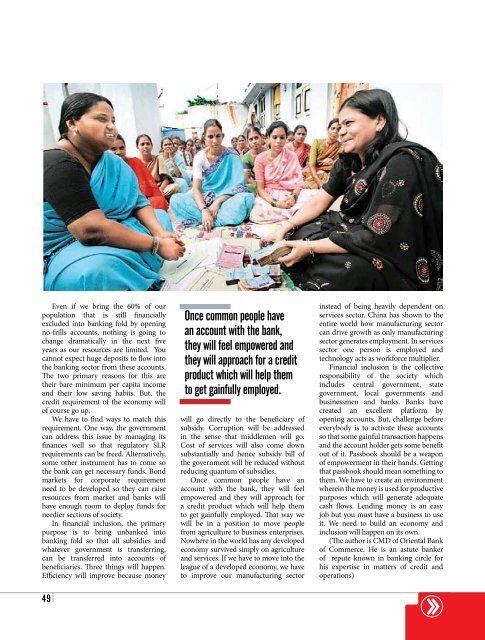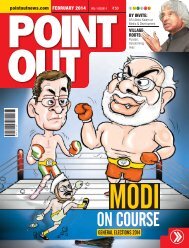You also want an ePaper? Increase the reach of your titles
YUMPU automatically turns print PDFs into web optimized ePapers that Google loves.
Even if we bring the 60% of our<br />
population that is still financially<br />
excluded into banking fold by opening<br />
no-frills accounts, nothing is going to<br />
change dramatically in the next five<br />
years as our resources are limited. You<br />
cannot expect huge deposits to flow into<br />
the banking sector from these accounts.<br />
The two primary reasons for this are<br />
their bare minimum per capita income<br />
and their low saving habits. But, the<br />
credit requirement of the economy will<br />
of course go up.<br />
We have to find ways to match this<br />
requirement. One way, the government<br />
can address this issue by managing its<br />
finances well so that regulatory SLR<br />
requirements can be freed. Alternatively,<br />
some other instrument has to come so<br />
the bank can get necessary funds. Bond<br />
markets for corporate requirement<br />
need to be developed so they can raise<br />
resources from market and banks will<br />
have enough room to deploy funds for<br />
needier sections of society.<br />
In financial inclusion, the primary<br />
purpose is to bring unbanked into<br />
banking fold so that all subsidies and<br />
whatever government is transferring,<br />
can be transferred into accounts of<br />
beneficiaries. Three things will happen.<br />
Efficiency will improve because money<br />
49<br />
Once common people have<br />
an account with the bank,<br />
they will feel empowered and<br />
they will approach for a credit<br />
product which will help them<br />
to get gainfully employed.<br />
will go directly to the beneficiary of<br />
subsidy. Corruption will be addressed<br />
in the sense that middlemen will go.<br />
Cost of services will also come down<br />
substantially and hence subsidy bill of<br />
the government will be reduced without<br />
reducing quantum of subsidies.<br />
Once common people have an<br />
account with the bank, they will feel<br />
empowered and they will approach for<br />
a credit product which will help them<br />
to get gainfully employed. That way we<br />
will be in a position to move people<br />
from agriculture to business enterprises.<br />
Nowhere in the world has any developed<br />
economy survived simply on agriculture<br />
and services. If we have to move into the<br />
league of a developed economy, we have<br />
to improve our manufacturing sector<br />
instead of being heavily dependent on<br />
services sector. China has shown to the<br />
entire world how manufacturing sector<br />
can drive growth as only manufacturing<br />
sector generates employment. In services<br />
sector one person is employed and<br />
technology acts as workforce multiplier.<br />
Financial inclusion is the collective<br />
responsibility of the society which<br />
includes central government, state<br />
government, local governments and<br />
businessmen and banks. Banks have<br />
created an excellent platform by<br />
opening accounts. But, challenge before<br />
everybody is to activate these accounts<br />
so that some gainful transaction happens<br />
and the account holder gets some benefit<br />
out of it. Passbook should be a weapon<br />
of empowerment in their hands. Getting<br />
that passbook should mean something to<br />
them. We have to create an environment<br />
wherein the money is used for productive<br />
purposes which will generate adequate<br />
cash flows. Lending money is an easy<br />
job but you must have a business to use<br />
it. We need to build an economy and<br />
inclusion will happen on its own.<br />
(The author is CMD of Oriental Bank<br />
of Commerce. He is an astute banker<br />
of repute known in banking circle for<br />
his expertise in matters of credit and<br />
operations)





